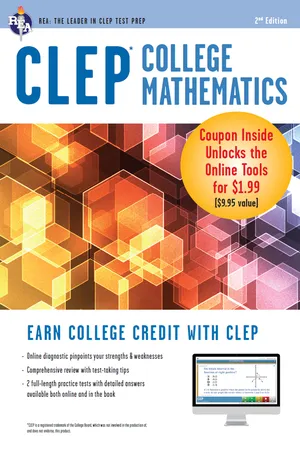
- 272 pages
- English
- ePUB (mobile friendly)
- Available on iOS & Android
CLEP® College Mathematics Book + Online
About this book
Earn College Credit with REA's Test Prep for CLEP® College Mathematics
Everything you need to pass the exam and get the college credit you deserve.
CLEP® is the most popular credit-by-examination program in the country, accepted by more than 2,900 colleges and universities. For over 15 years, REA has helped students pass the CLEP® exam and earn college credit while reducing their tuition costs.
Our CLEP® test preps are perfect for adults returning to college (or attending for the first time), military service members, high-school graduates looking to earn college credit, or home-schooled students with knowledge that can translate into college credit.
There are many different ways to prepare for the CLEP® exam. What's best for you depends on how much time you have to study and how comfortable you are with the subject matter. Our test prep for CLEP® College Mathematics and the free online tools that come with it, will allow you to create a personalized CLEP® study plan that can be customized to fit you: your schedule, your learning style, and your current level of knowledge.
Here's how it works:
Diagnostic exam at the REA Study Center focuses your study
Our online diagnostic exam pinpoints your strengths and shows you exactly where you need to focus your study. Armed with this information, you can personalize your prep and review where you need it the most.
Most complete subject review for CLEP® College Mathematics
Our targeted review covers all the material you'll be expected to know for the exam and includes a glossary of must-know terms.
Two full-length practice exams
The online REA Study Center gives you two full-length practice tests and the most powerful scoring analysis and diagnostic tools available today. Instant score reports help you zero in on the CLEP® College Mathematics topics that give you trouble now and show you how to arrive at the correct answer-so you'll be prepared on test day.
REA is the acknowledged leader in CLEP® preparation, with the most extensive library of CLEP® titles available. Our test preps for CLEP® exams help you earn valuable college credit, save on tuition, and get a head start on your college degree.
Frequently asked questions
- Essential is ideal for learners and professionals who enjoy exploring a wide range of subjects. Access the Essential Library with 800,000+ trusted titles and best-sellers across business, personal growth, and the humanities. Includes unlimited reading time and Standard Read Aloud voice.
- Complete: Perfect for advanced learners and researchers needing full, unrestricted access. Unlock 1.4M+ books across hundreds of subjects, including academic and specialized titles. The Complete Plan also includes advanced features like Premium Read Aloud and Research Assistant.
Please note we cannot support devices running on iOS 13 and Android 7 or earlier. Learn more about using the app.
Information
CHAPTER 1
Passing the CLEP College Mathematics Exam
CHAPTER 1
PASSING THE CLEP COLLEGE MATHEMATICS EXAM
| Test Yourself & Get Feedback | Score reports from your online diagnostic and practice tests give you a fast way to pinpoint what you already know and where you need to spend more time studying. |
| Review with the Book | Study the topics tested on the CLEP exam. Targeted review chapters cover everything you need to know. |
| Improve Your Score | Armed with your score reports, you can personalize your study plan. Review the parts of the book where you’re weakest and study the answer explanations for the test questions you answered incorrectly. |
| 10% | Sets |
| 10% | Logic |
| 20% | Real Number Systems |
| 20% | Functions and Their Graphs |
| 25% | Probability and Statistics |
| 15% | Additional Topics from Algebra and Geometry |
P.O. Box 6600
Princeton, NJ 08541-6600
Phone: (800) 257-9558 (8 A.M. to 6 P.M. ET)
Fax: (609) 771-7088
Website: www.collegeboard.org/clep
P.O. Box 6226
Princeton, NJ 08541-6226
Phone: (609) 771-7137 (Monday through Friday, 8 A.M. to 6 P.M. ET) TTY: (609) 882-4118
Fax: (609) 771-7944
E-mail: [email protected]
| Week | Activity |
| 1 | Take the Diagnostic Exam. The score report will identify topics where you need the most review. |
| 2—4 | Study the review chapters. Use your diagnostic score report to focus your study. |
| 5 | Take Practice Test 1 at the REA Study Center. Review your score report and re-study any topics you missed. |
| 6 | Take Practice Test 2 at the REA Study Center to see how much your score has improved. If you still got a few questions wrong, go back to the review and study any topics you may have missed. |
Table of contents
- Cover
- Title Page
- Copyright Page
- Contents
- About Our Author
- About Research & Education Association
- Acknowledgments
- Chapter 1: Passing the CLEP College Mathematics Exam
- Chapter 2: Sets
- Chapter 3: The Real Number System
- Chapter 4: Algebra Topics
- Chapter 5: Functions and Their Graphs
- Chapter 6: Geometry Topics
- Chapter 7: Probability and Statistics
- Chapter 8: Logic
- Practice Test 1
- Practice Test 2
- Glossary
- Index